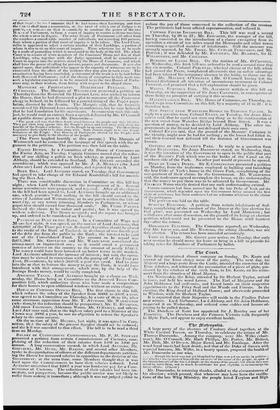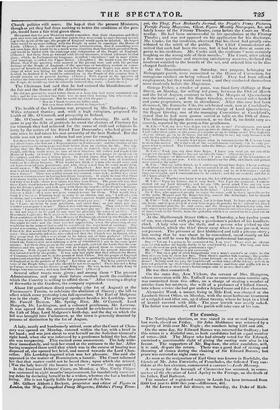airtrupoTig.
A large party of the electors of Finsbury dined together, at the White Conduit Tavern, on Thursday, to celebrate the return of Mr. Thomas Duncombe. Among the company, were Mr. Wilks (chair- man), Mr. O'Connell, Mr. Mark Phillips, Mr. Potter, Mr. Bilked, Mr. Bish, Mr. O'Dwyer, Major Revel, and Mr. Easthope. After the usual loyal toasts had been drunk, and that of the Duke of Sussex with especial honours, Mr. Wilks, in a hearty speech, proposed the health of Mr. Dunconibe as one who,
though his Letup was not yet blanched by time was yet no novice in politics— one who ha I ays proved himself the advoca!e of the cause of the people. in spine of the blandishments or the fair (4 laugh) or the frowns of the proud ; bat ahem they now asked to meet them, not so much to celebrate his past exploits, as to encourage his fut■ire effints. (Cheers.)
Mr. Duneombe, in returning thanks, alluded to the circumstances of his election ; which proved, that whatever may have been the vacilla- tions of the lute Whig Ministry, the people hated Toryism and High
Church politics still more. He hoped that the present Ministers, though as yet they had done nothing to better the condition of the peo- ple, would have a fair trial given them. tie trusted that the new Ministers would remember, that their characters and their past acts were not sufficient ; and that unless they were ready to move forward accord- 'log to the spirit (Attie Age. the people of England would again be deluded. Ile hoped there would be HO more trifling with the People in order to conciliate the House of Lords. (Cheers.) lie would tell the present Administration, that if something were not soon dune, they would be in a much worse situation than that which preceded them. and would be loaded with the contempt and indiguatiou of the People of England. (Cheers.) Let them then go forward with liberal measures. without reference to that place, which. in Parliamentary language, is called •• elsewhere." atul in more whim- sical language. is called the Upper Douse. (Laughter.) Ile would warn the Upper House, that if one question were mooted in the present state and with the present feelings of the People of England—if the questions of hereditary wisdom in cense- lamas,: of hereditary titles, and whether a Per in Florence or Naples was more tit to judge of what was fitting for the country than those who ICS111,41 in it. were once mooted, he doubted if it would lx• satisfactory to the People of this errantry that it should remain on its present footing. (Cheers.) 1,Vitli regard to the gut:sakes of whether the Doverument was willing to go forward in accordance with the feelings of the People, he would, say that he sincerely believed they were. (Loud cher rs.)
The Chairman had said that he had resisted the blandishments of the fair and the frowns of the Aristocracy.
Ile did not pretend to stand before them as a man who had over committed any folly ; and he was satisfied that there was no man then hearing hint who could say that he himself was innocent. But he would say with the poet- " Nor do I blush to own my follies past. But own those follies should no longer last."
The health of the Chairman was proposed by Mr. Easthope ; Mr. Wilks returned thanks ; and, with it high eulogium, proposed the health of Mr. O'Connell, and prosperity to Ireland.
Mr. O'Connell rose amidst enthusiastic cheering. He said, he came to pay the debt of gratitude he owed the electors of Finsbury for the triumph they had achieved for the cause of civil and religious li- berty by the return of his friend Tom Duncombe ; who had given no vote since he had taken his seat unworthy of the best Radical. But the battle was not yet von : reform had not gone far enough. Let them then he up and stirring. Ile said that it was robbery to force any man to nay direct taxes who had not a Representative in Parliament ; and the election of the Representatives for seveu years was little better than au election for life. But sup- posing that the Douse of ('out mots was ready to concede their jest rights to ths People, still they could never be sure ut their liberties, till reform had reached the Douse or ewes. (Cheers.) The time was come, when it was proper to speak out net this subject, anal this was a fitting place. In feudal times, they had often heard of hereditary lawgivers and hereditary judges; but did they ever bear of hereditary tailors or hereditary lawyers. What would you thiak or a man who would cone and ask leave to mend your pantaloons, and who, when asked how he could mend them, would answer, " My father was a t tiler 2" (Laughter) And how would you like a man to plead stir rinse. whose only claim on your confidence was. that his graielftther was a lawyer? There was neither reason nor common sense in it ; neither was there reason or common sense in having hereditary lawgivers. It might be trite that there were many worthy men in the [loose of Lords; and there were also many Iris enters, but they were Lords—there were idiots, but they were Peers. The great evil was, that these Lords stood between the People :Lull their liberties. They put their long spoons into the People's plates, and took away with Ihent the benefits of the. People's industry. Let the People be up and stirring. What did the People cote whether a man was a duke or a dackl—th .y were not guise enough to Cate for them. What would they thick if a teeter is Finsbury were to come to an elector, and say. " I will give pin medicine, and you must pay me :" The elector's answer would naturally be, " am not sick ; I do nut want your medicine, and so won't pay psi." " But," say+ the doc- tor. " I gavd medicine to your neighbour, and cured him ; so you most ply me, whether you require it or not." Thus it was with the parsons. They said to the I Us- senters, " I prayed with your neighbour, so you most pay me." Ile was a law er, but he did not expect to be paid by rue Man hr pleading the cause of au:tth, •phtt Hereditary Legislative Holy might to be done away with. Both Iltat:es ought to he Re; resentatives of the Peosl s Two Houses of Parliament, elected by the People, necessary to give fixity to the liberties of the People. The time was cow cure when this might be said ; and the time was fast approaching when the plundering of our neighbour in the name or Goa would, he considered the worst kind of sacrilege. The period was coming, when Christianity would vindieate itself front those stains which dcfaced it. But would the People continue louger to be the slaves of the paltry Aristo- cracy—those miserable deluders, who called out that the Church was in danger. when they meat that the titlit s were about to be taken out of their pockets ? (Cheers.) The People had already turned James the Second ant without bloodshed, and they had turned the Tories (after accu7nulating a debt of S00,000,0000 out hi the same wrier matiner. Let them then go out in the same good path, and tell the Lords that the con- stitution and the spirit of the times will no longer permit them to continue their dominion. With regard to the Ministers, he firmly believed the present Administra- tion intended well by the public. It was only last night that they allowed the House of Commons to strike out Ss. in the pound of Irish Tithes. Did the people of Engla sot understand what that meant? Why should not Ss. be as good in the pockets of the People of England as in the pockets of Paddy ? Let them go OIL The King yielded to the voice of the People before,:trul why should he not 110 so again? There was not a King in Europe so secure on his throne as our King was. Ile was, in hict, the only King in Europe who was secure; and may God bless him ! (Cheers.) Several other toasts were given ; and among them " The present Administration, and may their future conduct merit the confidence which the Country is willing to afford them." After viewing a display
of fireworks in the Gardens, the company separated.





















 Previous page
Previous page